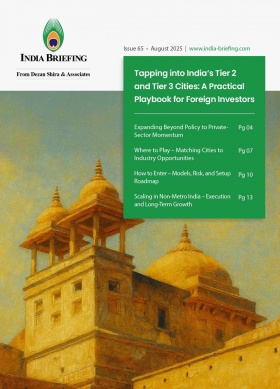India-China Relations Take Center Stage at SCO Summit 2025
The 2025 Shanghai Cooperation Organization (SCO) Summit in Tianjin brought India and China back into the diplomatic spotlight, marking Prime Minister Narendra Modi’s first visit to China in seven years.
Amid escalating US tariff disputes, the engagement signaled a strategic bid by both nations to recalibrate ties while navigating a shifting global trade order.
Takeaways from the SCO summit for India-China ties
The Indian Prime Minister Narendra Modi and Chinese President Xi Jinping met in Tianjin on the sidelines of the 2025 SCO summit – their first interaction since October 2024 at the BRICS summit held in Kazan, Russia.
The meeting signaled a potential reset in bilateral ties, offering important diplomatic optics at a time of heightened global trade uncertainty.
Key developments include:
- Diplomatic reset: Modi and Xi acknowledged steady progress since their last meeting at the BRICS summit in October 2024, emphasizing partnership over rivalry.
- Connectivity: Both sides agreed to resume direct passenger flights, which have been suspended since COVID-19, though no timeline has been set. Travelers currently transit via Hong Kong or Singapore.
- People-to-people links: India has restarted tourist visa issuance for Chinese citizens, while the Kailash Mansarovar Yatra resumed earlier in 2025.
- Border stability: Progress on disengagement has reduced tensions, helping restore peace in sensitive areas.
- Global South role: Xi framed India and China as central actors in shaping regional stability and advancing development.
- Economic cooperation: Potential Chinese investment in India’s electric vehicle industry and greater access for Chinese firms in the Indian market were highlighted.
- Trade resumption: Both countries agreed to reopen border trade, with China assuring cooperation on critical supplies, such as rare earths, fertilizers, and tunneling equipment.
- Geopolitical context and regional cooperation: The engagement comes as India’s trade relations with the US face headwinds from tariff measures, raising questions about shifting geopolitical alignments.
Further, India reaffirmed support for regional connectivity projects, notably the Chabahar Port and the International North-South Transport Corridor (INSTC). It also spotlighted opportunities in startups, innovation, youth initiatives, and cultural exchange as levers for deeper regional cooperation.
Signs of normalization in India-China bilateral relations in 2025
In August 2025, India and China held high-level talks in New Delhi, signaling a step toward easing tensions since 2019. During Foreign Minister Wang Yi’s visit (August 18-19, 2025), both sides agreed to resume direct passenger flights, reopen border trade, encourage investment flows, and establish three new border-related mechanisms.
The planned revival of direct air services – once carrying over 800,000 passengers annually before the pandemic struck – is expected to boost tourism, trade, and cargo flows while reducing reliance on indirect routes. These moves reflect a pragmatic recalibration of ties, even as broader geopolitical headwinds persist.
Notes for business stakeholders
- Watch policy and regulatory updates: Border mechanisms, trade rules, and visa regulations may evolve quickly; staying informed ensures smoother operations and timely market entry.
- Monitor air and trade connectivity: With direct passenger flights and border trade routes set to reopen, companies in logistics, tourism, and trade-dependent sectors should explore new routes to reduce transit costs and time.
- Evaluate investment opportunities: China has indicated potential for investment flows, especially in sectors like electric vehicles, infrastructure, and technology. Indian firms should identify strategic partnerships or joint ventures in sectors approved by both governments.
- Supply chain diversification: Improved border trade and cooperation on critical supplies (rare earths, fertilizers, tunneling equipment).
- Leverage cultural and people-to-people initiatives: Programs in innovation, startups, and youth engagement may open avenues for knowledge exchange, R&D collaboration, and talent acquisition.
- Stay geopolitically agile: While bilateral ties are improving, broader global trade tensions, particularly with the US, require businesses to maintain flexible sourcing, risk assessment, and contingency planning.
2025 SCO Summit in Tianjin, China: Key outcomes
The 25th Meeting of the Council of Heads of State of the SCO, held in Tianjin, concluded with the signing of 20 significant documents that set the agenda for the grouping’s political, economic, and institutional direction.
Strategic declarations and frameworks
The SCO summit concluded with the adoption of the Tianjin Declaration, the central political outcome of the meeting. Leaders also approved the SCO Development Strategy (2026-2035), which sets long-term priorities for the organization over the next decade. A Cooperation Programme (2026-2030) was endorsed to counter extremist ideologies within the region, while a Roadmap for Energy Cooperation until 2030 was launched to strengthen collaboration in the energy sector. In addition, the SCO was granted observer status within the Commonwealth of Independent States (CIS) and Cholpon-Ata in the Kyrgyz Republic was named the SCO’s tourist and cultural capital for 2025-2026.
Institutional strengthening
In terms of efforts to strengthen institutional capacity, four new SCO centers were established, each with a specific focus:
- Addressing security threats
- Combating transnational organized crime
- Enhancing cybersecurity and information safety
- Advancing anti-drug cooperation
The summit also approved the creation of an SCO Development Bank, aimed at financing infrastructure, promoting economic growth, and supporting social development across member states.
Expanded cooperation platforms
The SCO has broadened its cooperative agenda by launching new platforms and centers in key areas. These cover energy security and sustainable growth, green industry and climate action, the digital economy and cybersecurity, artificial intelligence (AI), innovation, higher education, and vocational and technical training for workforce development.
Structural reforms and membership expansion
A major institutional reform was agreed upon, merging observer states and dialogue partners into a single category of SCO partners. As part of this expansion, Laos was granted partner status, bringing the SCO community to 25 nations – 10 full members and 15 partners.
SCO Plus session
Alongside the main summit, the “SCO Plus” session was also convened under the theme “Turning Multilateralism into Action, Ensuring Regional Security, and Promoting Sustainable Development.” It was attended by SCO member states, partners, and observer countries such as Mongolia, Turkey, Nepal, and Vietnam, as well as representatives of international organizations including the United Nations (UN), the Association of Southeast Asian Nations (ASEAN), the Collective Security Treaty Organization (CSTO), the European Economic Community (EEC), and the Asian Infrastructure Investment Bank (AIIB).
What is the SCO?
The Shanghai Cooperation Organization (SCO), founded in 2001, is a regional political, economic, and security grouping that facilitates cooperation on trade, connectivity, energy, and regional stability. As of 2025, it has 10 full members: China, India, Russia, Pakistan, Kazakhstan, Kyrgyzstan, Tajikistan, Uzbekistan, Iran, and Belarus.
The SCO also engages with observer states and dialogue partners, broadening its influence across Eurasia. As of 2025, it has 15 dialogue partners – including Armenia, Egypt, Qatar, Saudi Arabia, Turkey, and the UAE – who participate in selected activities and discussions within the grouping.
About Us
India Briefing is one of five regional publications under the Asia Briefing brand. It is supported by Dezan Shira & Associates, a pan-Asia, multi-disciplinary professional services firm that assists foreign investors throughout Asia, including through offices in Delhi, Mumbai, and Bengaluru in India. Dezan Shira & Associates also maintains offices or has alliance partners assisting foreign investors in China, Hong Kong SAR, Vietnam, Indonesia, Singapore, Malaysia, Mongolia, Dubai (UAE), Japan, South Korea, Nepal, The Philippines, Sri Lanka, Thailand, Italy, Germany, Bangladesh, Australia, United States, and United Kingdom and Ireland.
For a complimentary subscription to India Briefing’s content products, please click here. For support with establishing a business in India or for assistance in analyzing and entering markets, please contact the firm at india@dezshira.com or visit our website at www.dezshira.com.
- Previous Article Tapping into India’s Tier 2 and Tier 3 Cities: A Practical Playbook for Foreign Investors
- Next Article India’s Passport Status in 2025: New Developments and Business Opportunities












